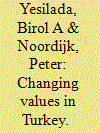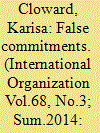|
|
|
Sort Order |
|
|
|
Items / Page
|
|
|
|
|
|
|
| Srl | Item |
| 1 |
ID:
095676


|
|
|
|
|
| Publication |
2010.
|
| Summary/Abstract |
Using data from the World Values Surveys, this study examines changing values in Turkey and shows that rising religiosity and intolerance can be traced back to 1995 and have become more visible during the AKP's rule. Moreover, Turks are found to be the most religious of all the societies compared in the study. Findings suggest that Turkish voters are likely to continue being attracted to political parties like the AKP in the future, which would have important implications for Turkey's relations with its traditional friends in the West.
|
|
|
|
|
|
|
|
|
|
|
|
|
|
|
|
| 2 |
ID:
133272


|
|
|
|
|
| Publication |
2014.
|
| Summary/Abstract |
A substantial international relations literature addresses the various ways in which international actors, and the norms they promote, influence state behavior. But less attention has been paid to the influence these actors directly exert at the local level, despite the fact that many transnational campaigns promote norms for which individuals-not states-are the primary transgressors. If individuals behave as some states do, publicly embracing international norms only because they expect a financial or reputational benefit from doing so, then the campaigns have not fully succeeded. But when do individuals engage in real behavior change, and when do they simply change the public image they present to the international community? To begin to address this question, I employ a randomized field experiment to evaluate individuals' willingness to make claims that differ from their true normative commitments. I conducted the experiment in the context of an original 2008 opinion survey about female genital mutilation and early marriage, run in rural Kenya. I find that respondents misrepresent their behavior and intentions, and I supplement these findings with an exploration of causal mechanisms through qualitative interviews.
|
|
|
|
|
|
|
|
|
|
|
|
|
|
|
|
| 3 |
ID:
094294


|
|
|
|
|
| Publication |
2010.
|
| Summary/Abstract |
As one of the promising energy sources for the next few decades, nuclear energy receives more attention than before as environmental issues become more important and the supply of fossil fuels becomes unstable. One of the reasons for this attention is based on the rapid innovation of nuclear technology which solves many of its technological constraints and safety issues. However, regardless of these rapid innovations, social acceptance for nuclear energy has been relatively low and unchanged. Consequently, the social perception has often been an obstacle to the development and execution of nuclear policy requiring enormous subsidies which are not based on the social value of nuclear energy. Therefore, in this study, we estimate the social value of nuclear energy-consumers' willingness-to-pay for nuclear energy-using the Contingent Valuation Method (CVM) and suggest that the social value of nuclear energy increases approximately 68.5% with the provision of adequate information about nuclear energy to the public. Consequently, we suggest that the social acceptance management in nuclear policy development is important along with nuclear technology innovation.
|
|
|
|
|
|
|
|
|
|
|
|
|
|
|
|
| 4 |
ID:
168652


|
|
|
|
|
| Summary/Abstract |
Interconnectors have value for Britain, providing access to cheaper Continental power, security of supply, and managing increased renewables, prompting proposals for substantial new interconnectors. The EU Target Electricity Model requires interconnector market coupling via Day Ahead and IntraDay Markets. We examine the efficiency and value of uncoupled and coupled trading for the four DC interconnectors to GB, over different timescales from year ahead to intraday, and the social costs and benefits not reflected in the private benefits. Because the GB carbon tax is not replicated abroad it transfers some €65 m./yr to the foreign interconnector part-owners and creates distortions when trade flows change. IFA and BritNed have a commercial value of about €500 million/yr, create additional infra-marginal surplus of €25 m./yr, but suffer €30 m./yr deadweight loss from the asymmetric GB carbon tax. The island of Ireland was coupled in Oct 2018, dramatically reducing trading inefficiency. While further investment in interconnectors appears socially profitable, it is important to harmonise carbon taxes across the EU. If GB leaves the EU and is uncoupled, some of these trading gains would be sacrificed, but other financial markets may alleviate the cost of Brexit, making policies to enhance liquidity desirable.
|
|
|
|
|
|
|
|
|
|
|
|
|
|
|
|
|
|
|
|
|